Fall has arrived, and that means lots of leaves are sprouting on your lawn, driveways, and driveway.
A leaf blower is usually considered an essential gardening tool for managing leaf litter. However, there are some environmental concerns to keep in mind before turning on leaf blowers.
This piece of gardening kit can emit greenhouse gases, erode soil quality, and destroy local habitats. I spoke to an environmental expert about five ways leaf blowers can harm your local environment, and what you can do to help.
1. Leaf blowers contribute to the greenhouse effect
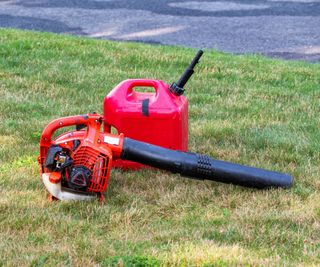
(Image credit: Getty Images/WoodysPhotos)
Gas-powered leaf blowers are one of the worst sources of household greenhouse gas emissions. They are one of many tools regulated by California’s small-engine ban, and several other states and municipalities are considering similar restrictions.
It seems exaggerated and many think it makes no sense: surely larger car engines are worse for greenhouse gas emissions?
However, it is because of the type of engine. Unlike cars, gas leaf blowers use two-stroke engines. They are lightweight, perfect for a portable tool, and they work by combining gasoline and oil to keep the parts running smoothly. However, this mixture of gasoline and oil produces toxic fumes, which you can see and smell when using a gas tool.
That’s bad enough, but unlike modern cars, leaf blowers don’t have catalytic converters. Catalytic converters react with the most dangerous byproducts of exhaust gases to prevent them from entering the atmosphere. Environmental expert David Burrows told me that “gas-powered leaf blowers have little or no exhaust filtration requirements and therefore can produce more carbon monoxide and higher levels of formaldehyde and benzene than a car or SUV.”
David adds that it’s not just the fumes. “The microparticles and dust that leaf blowers push into the atmosphere increase urban ozone levels and create breathing difficulties for those sensitive to air quality conditions.”
While the effect is small with a single leaf blower, a neighborhood of people using gas-powered leaf blowers can be detrimental to the local environment. You can mitigate some of the effects by choosing a cordless leaf blower, like this EGO Leaf Blower from Walmart.
David is the founder of Arkearth, a nonprofit organization dedicated to saving pollinators, increasing plant life, and reducing food deserts.
2. Leaf blowers can affect the quality of the soil
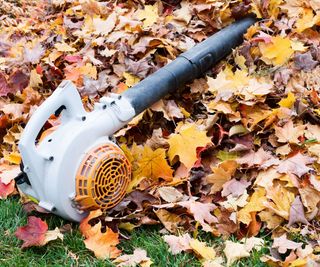
(Image credit: Getty Images/skhoward)
If you love growing plants and vegetables, you should also know how leaf blowers can affect the quality of your soil. This is not true for all models, but high-quality gas leaf blowers and wheeled ones can ruin your soil.
David Burrows says, “Industrial leaf blowers are powerful because the wind force they create not only blows away leaves and debris, but also the precious topsoil that causes erosion and unnecessary runoff from rain or sprinklers.”
Runoff can be terrible for your yard. Not only does it turn a pristine lawn into a swamp, but if you have a pond or stream in your yard, it will carry pesticides and fertilizers into the water, polluting it. If it doesn’t drain, it’s also a breeding ground for mosquitoes and other pests.
You can avoid this problem by raking instead of using a leaf blower, or by opting for a low-powered cordless leaf blower that won’t damage the topsoil.
3. Leaf blowers can destroy leaf habitats
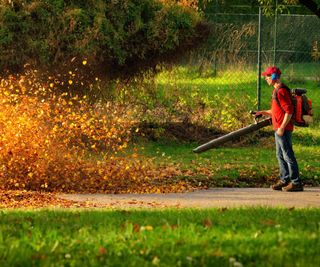
(Image credit: Getty Images / Smileus)
In addition to damaging the soil, leaf blowers destroy valuable habitat. Leaf litter is a crucial habitat for insects, which are vital food for other animals such as birds.
David Burrows says, “Leaf blowers remove a significant amount of the upper-level environment in which many species of pollinators and beneficial insects live. They also blow away insects and seeds that native species of birds and lizards depend on for food.”
This can wreak havoc on your local ecosystem, throwing local populations off balance or eliminating them entirely. David says it can even affect endangered species. “Leaf blowers can also remove leaves that may contain caterpillar or butterfly eggs. Some of these species are endangered, like the monarch butterfly.”
To help reduce damage to local wildlife, be sure to check your leaf litter before blowing or raking so you can remove any animals hiding inside.
4. Leaf blowers cause noise pollution
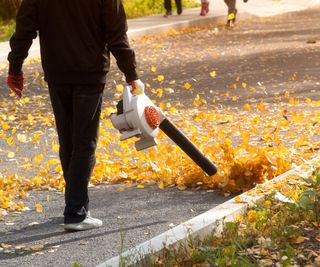
(Image credit: Getty Images/Aleksandr Potashev)
Leaf blowers are notoriously loud. They are one of the loudest gardening tools you can use, and this noise pollution can be very harmful to your local environment.
David told me, “Homeowners and landscapers are subjected to noise levels of 95 decibels or more when using a gas-powered leaf blower. That’s 10 decibels more than the OSHA hearing protection requirement of 85 dB and below.”
While this damage can be mitigated with ear protection like this one from Amazon, it can be very damaging in the local area. This is because leaf blower noise is low frequency, so it can travel hundreds of feet and pass through walls. If you’ve ever been annoyed by the hum of a leaf blower several streets away and wondered how you could hear it, it’s because leaf blowers are especially damaging because of this low frequency noise.
Cordless blowers are quieter than gas lawnmowers, but you’re better off using a rake or snow blower like this one from Amazon. These don’t make any noise.
5. Leaves are not always reused
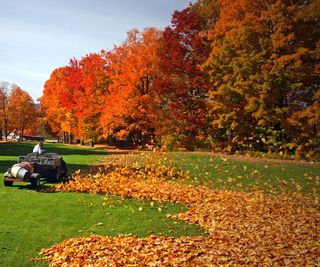
(Image credit: Getty Images / Cappi Thompson)
A final problem with leaf blowers is what happens to the leaves afterwards. David says, “Many gardeners who use leaf blowers also bag the remaining leaves, which are hauled off to landfills where they are buried and provide no future benefit to the environment.”
Decomposing leaves are a vital source of nutrients for plants and grass. Blowing them off your flowerbeds and lawns and placing them in plastic bags traps all these benefits in the plastic for decades as the bags decompose, damaging soil fertility and plant growth and health.
Instead, try reusing the leaves in compost, mulch, or as leaf mold. You can also leave them in your flower beds to decompose and provide nutrients for your plants.
Leaf Blower FAQs
What should I do instead of using a leaf blower?
It’s not always practical on large lawns and driveways, but raking and sweeping are much better for the environment than leaf blowing.
David says, “Raking leaves (though more timely and labor intensive) is what we recommend in our pollination gardens. This allows you to move leaves and debris to a compost area on your property, where the organic material can be used in the spring for a richer, healthier yard and garden.”
Leaf blowers can not only damage the environment, but they can also be antisocial if they make a lot of noise. It is always best to check the HOA rules on when and how long you can run your leaf blower to stay on the right side of leaf blower etiquette.
#Leaf #Blowers #Bad #Environment #Ways #Leaf #Blowers #Damage #Garden #Habitats #Avoid